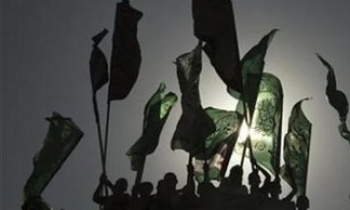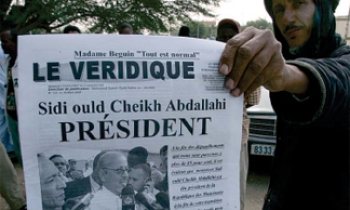In the modern world, the twin liberal values of press freedom and religious tolerance can easily conflict with each other. In January, this tension between censorship and expression came to a head in Europe and the Middle East. The publication of cartoon depictions of the prophet Muhammad in a Danish newspaper set off a wave of protests, some turning violent. The newspapers and their supporters claim they are defending their right to free speech, but many Muslims argue that the cartoons should not have been published due to their divisive, inflammatory and blasphemous nature. Charges of double standards have fanned the flames of controversy, but despite the sound and fury, journalistic freedoms in Europe are not likely to be abridged by government censorship.
Drawing the Forbidden Face
The saga began last September, when Politiken, a Danish paper, published a story about the author of a children’s book about Islam who could not find any illustrators willing to contribute to the book for fear of reprisal from Islamic extremists. This stirred a nationwide debate on self-censorship to which another paper, Jyllands-Posten, responded by asking 40 cartoonists to submit their interpretations of the prophet Muhammad. Twelve responded to the challenge, and the paper published their cartoons along with an article opining, "We are on our way to a slippery slope where no-one can tell how the self-censorship will end." The cartoons ranged from the provocative, depicting Muhammad with a bomb-shaped turban or turning suicide bombers away from heaven while stating, "We’ve run out of virgins," to several that accused Jyllands-Posten and the children’s book author of engineering a publicity stunt.
Former Danish ambassadors and political opponents within Denmark have criticized Anders Fogh Ramussen, the Danish prime minister, for failing to accept a meeting with eleven ambassadors from Arab nations in early October, arguing that the violent protests and embassy burnings in the Middle East could have been avoided had the issue been resolved on a diplomatic level. Rasmussen’s administration maintains that the refusal was predicated on their interpretation of the ambassadors’ request as a call for legal action against the paper, which under the Danish system would be handled by the courts. On the domestic front, a police investigation into whether the cartoons violated laws against blasphemy and hate speech concluded in January that there was no evidence of a criminal offence. In a letter to the United Nations, the Danish government wrote that the prosecutor judged the paper to have behaved within its rights: "the article in question concerns a subject of public interest, which means that there is an extended access to make statements without those statements constituting a criminal offense."
Unequal Justice under Law?
According to Professor Fredrick Schauer, a specialist in the First Amendment at the Kennedy School of Government, Denmark’s laws restricting free speech are not unusual. "The United States is an outlier, as the only democracy that has no laws regarding hate speech," he told the HPR. He pointed to France as an example. Having fined both politician Jean-Marie Le Pen for disparaging remarks about the Holocaust and actress Brigitte Bardot for anti-Arab remarks, the French government undertakes a fairly evenhanded approach to punishing hate speech. Other countries, Schauer noted, "significantly under-enforce their incitement to racial hatred laws," pointing to the rise of neo-Nazi groups in some nations.
In a discussion at the John F. Kennedy, Jr. Forum at Harvard’s Institute of Politics, Schauer placed Denmark in the "libertarian" category of Western European nations, saying that it "has tolerated forms of hate speech that are technically illegal" and that the Danes are "committed to free speech being dominant over a large range of other values." These disparities in enforcement are no doubt an issue for many Muslims living in Europe, and help fuel the charges of a double standard made by opponents of the cartoons, who point out that three years ago Jyllands-Posten refused to print cartoons that satirized the resurrection of Jesus on the grounds that they might "provoke an outcry."
Despite such claims, the situation is unlikely to be settled by stricter government control over free speech. In an interview with the HPR, Harvard Professor Alex Jones discussed the difficulties involved in passing new legislation to restrict speech. Any attempt by European authorities to do so "would be perceived as a muzzle on free speech," which would cause problems for governments that have traditionally stood against censorship. The double standard argument will fail to garner much support for legislation, Jones said, because "there is also a double standard in the Arab world," where virulently anti-Semitic cartoons are standard fixtures in state-run newspapers and freedom of religious expression is often curtailed. The upshot of the controversy, according to Jones, is a reminder that "both free speech and responsibility are essential to the West," resulting in "a change in behavior, not law" for the European press.
Would Be Prudent
Father J. Bryan Hehir, president and secretary for social services of Catholic Charities in the Archdiocese of Boston and professor at the Kennedy School, agrees that the question is one of virtue, rather than law. Speaking at the Institute of Politics, Hehir opined that the issues raised by the cartoons are "much harder to deal with than some of the already difficult questions of global governance in an interdependent world." As a guideline for the interplay between a globalized press and transnational religions, Hehir offers: "What is legal may not be wise, and what is possible may not be prudent." In the West, no significant support for press censorship has arisen as a result of the controversy over the Muhammad cartoons. Indeed, Father Hehir’s call to "moral prudence and political wisdom" echoes the executive director of the Council on American-Islamic Relations, Nihad Awad, who wrote to the Danish ambassador to the United States to promote "good judgment and common sense to avoid actions that will be perceived as intentionally insulting to others or that will promote hatred."
From the perspective of censorship and freedom of the press, the situation borders on the ironic. What began as a commentary on self-censorship in the media may result in a call for greater self-scrutiny by the press. The question of double standards for what newspapers choose to print may best be solved in this way, within media outlets rather than imposed from above. Greater sensitivity to this issue may be the enduring legacy of the infamous cartoons.









